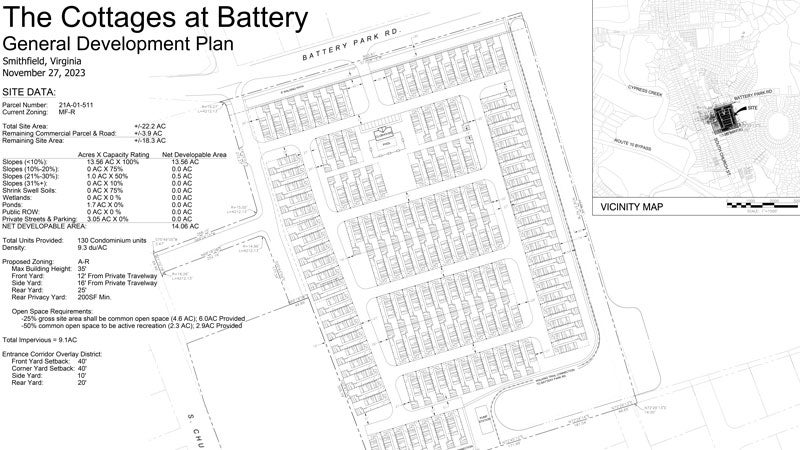Smithfield planners endorse ordinance change requested by ‘Cottages at Battery’ developer
Published 12:17 pm Thursday, January 11, 2024

- A revised site plan for 14 acres behind the Royal Farms gas station shows 130 single-family homes, down from the 150 condominiums approved for the site in 2020. (Image courtesy of Town of Smithfield)
Smithfield’s Planning Commission voted 4-1 on Jan. 9 to advance a proposed zoning ordinance change that, if approved by the Town Council, would provide a path forward for the stalled “Park at Battery” housing development.
The council had approved multifamily residential zoning for 14 acres behind Smithfield’s Royal Farms gas station at Battery Park Road and South Church Street in 2020 to allow Virginia Beach-based developer John Mamoudis to build 150 condominium units across 15 multifamily buildings, but the project never broke ground. Suffolk-based Quality Homes Inc., which is in negotiations to acquire the project and rename it “Cottages at Battery,” is proposing to instead build 130 detached, roughly 1,000- to 1,300-square-foot one- and two-story houses.
Developer Brian Mullins proposes to apply for attached residential zoning. Currently the town’s definition of attached residential allows detached houses only by special use permit and only if such units don’t comprise more than 25% of the total units planned. The zoning ordinance change Mullins is requesting would allow him to apply for attached residential zoning by allowing by special use permit any elements of what he’s proposing that currently conflict with the attached residential standards.
Under Mullins’ plan, the land wouldn’t be subdivided into individually owned lots. Rather each house’s exterior and the land surrounding it would be maintained by a homeowners association. The specific zoning ordinance changes Mullins seeks would repeal a requirement that “minimum lot and yard requirements” be met “as if lot lines existed,” and replace it with language stating “all” zoning district regulations must be met “as if lot lines existed, unless approved by special use permit.”
Commissioner Charles Bryan, who cast the dissenting vote, took issue with changing the town’s zoning ordinance at the request of a developer.
“It’s almost as if every two or three months we are revising our ordinances,” Bryan said.
In 2022, Bryan voted with other commissioners to unanimously advance an ordinance change allowing mixed-use developments, which the Town Council then enacted in July of that year. Five months following the council vote, the town saw its first application for the new planned mixed-use development, or PMUD, zoning from developer Joseph Luter IV, who’s 267-home Grange at 10Main subdivision at the western edge of the town’s historic district received rezoning approval in 2023.
“I was fine with that,” Bryan said, “but what made it become a concern to me was the immediate application of another developer who wanted to put in another PMUD.”
In August, Charlottesville-based developer Greenwood Homes applied for PMUD zoning for “The Promontory,” which would add 262 homes and five commercial parcels along Benns Church Boulevard.
“We’re trying to control growth here,” Bryan said, asserting the proposed ordinance change “undermines the zone’s intent.”
Commissioner Randy Pack and the body’s newly elected chairwoman, Julia Hillegass, however, each argued the zoning change would only create a mechanism to allow Mullins to submit a zoning application, and would not guarantee approval of his rezoning request. Any rezoning application would first need to be reviewed by the town and Isle of Wight County staff before heading back to the Planning Commission and Town Council for public hearings and a vote.
“We’ve got a long way to go before this is coming back to us again,” Hillegass said.
“If we don’t make this text change, it’s done,” Pack said, asserting Mullins would not even be able to apply for rezoning.
Commissioner Thomas Pope said the roughly 13% reduction in density from what Mamoudis had proposed “is going to be a benefit, in my opinion” since it would reflect a decrease in the traffic and school enrollment impacts county staff had forecast in 2020 under the original 150-unit proposal.
That said, “I don’t know who wants to pay $300,000 or $400,000 for 1,200 square feet,” Pope asserted.
Mullins, at the commissioners’ Dec. 12 meeting, had estimated home prices would start at $350,000, up from the $190,000 starting price Mamoudis had proposed for the multifamily units.
If the Town Council approves the ordinance change and Mullins files an official rezoning application, town staff say he would also need to seek an amendment to the future land use map in the town’s comprehensive plan, a Planning Commission waiver to allow non-contiguous open space and three special use permits. One would allow the proposed 9.3-unit-per-acre density, up from the eight-unit-per-acre maximum presently allowed under attached residential zoning. Another would allow smaller lot widths. The third would waive parking and loading requirements.





